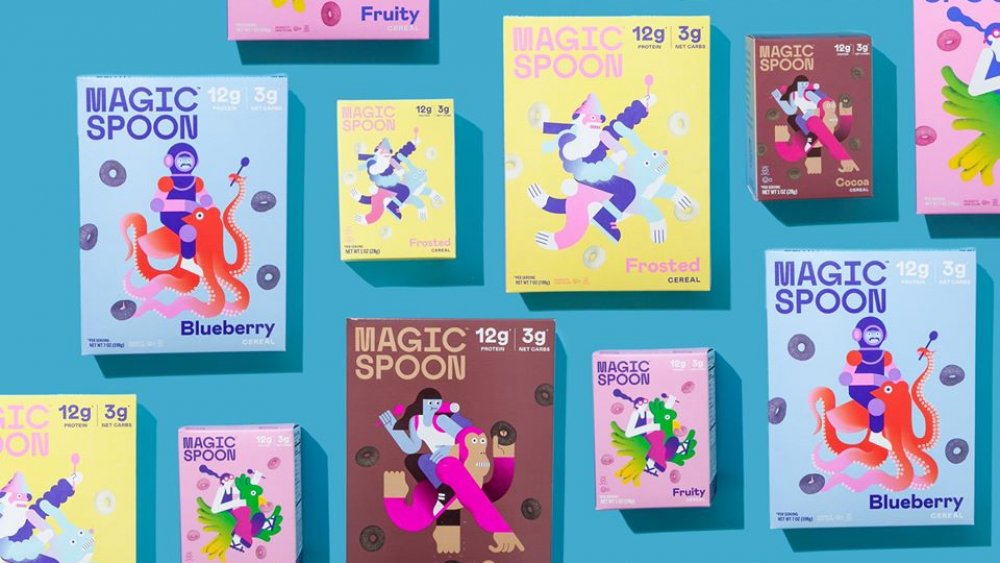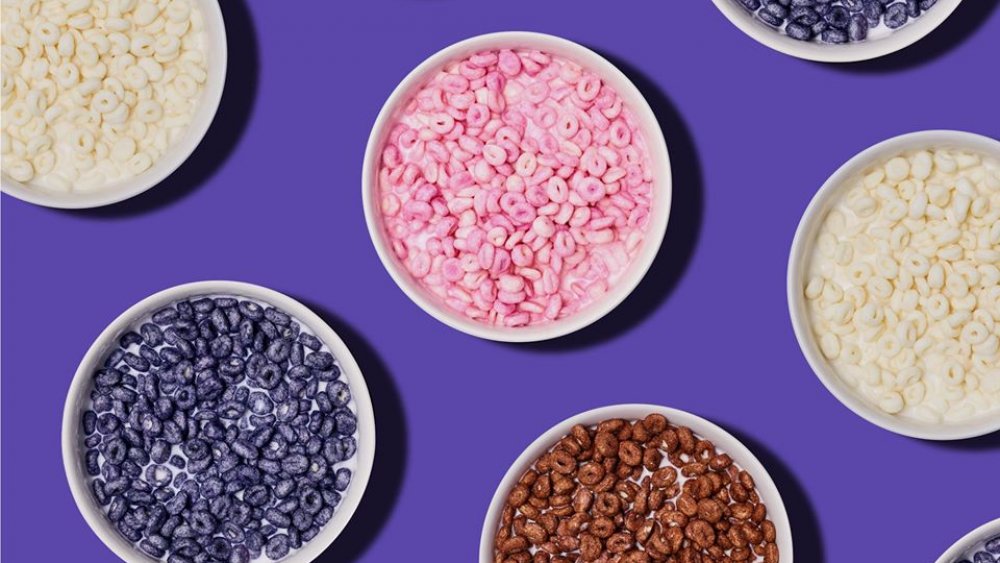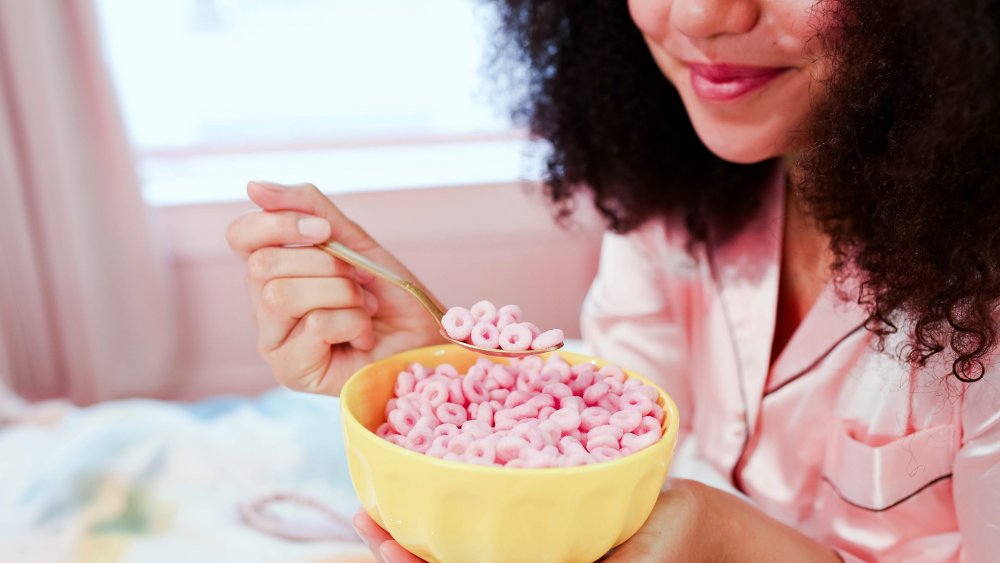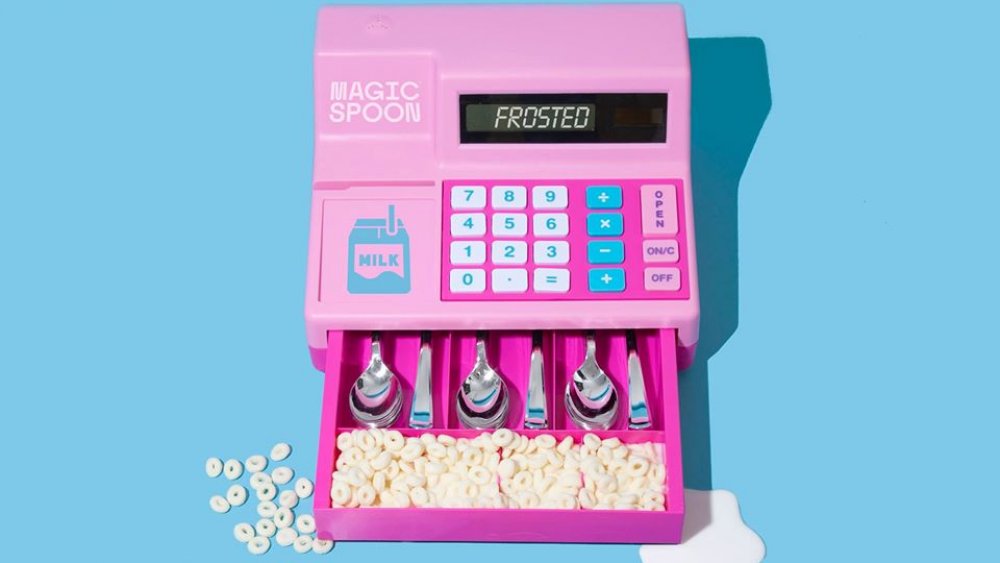The Truth About Magic Spoon Adult Cereal
Most breakfast cereal, with its pastel-colored pieces and cute cartoon mascots, is obviously marketed towards kids. The idea, after all, used to be that cereal was something busy moms would pour in a bowl for the kids to eat before rushing off to school, and that once those kids reached adulthood, they would graduate towards more grown-up breakfasts like, say, an Egg McMuffin or a Starbucks venti chai latte.
Well, those may, indeed, be the adult breakfasts of choice, but in recent years, more and more adults have been coming out of the closet to admit that all those boxes of Captain Crunch in their grocery carts aren't for taking home for the kiddies, but are going to be eaten by them. For dinner. A recent survey by YouGov revealed that nearly 80 percent of all adults eat cereal for meals other than breakfast, and 30 percent do so all the time.
Clearly, it's time cereal manufacturers got with the program. If adults are eating so much cereal, why not market a cereal that's actually created with them in mind? Well, finally there is such a thing: Magic Spoon. This is a cereal that offers the nutritional value that appeals to label-reading, health-conscious grown-ups, but still has that sweet taste of childhood. Even its boxes are still colorful and cartoon character-adorned, but look more like something designed by Peter Max than a sugar-crazed kindergartner.
How nutritious is Magic Spoon?
As Magic Spoon founders Gabi Lewis and Greg Sewitz told Business Insider, Magic Spoon was meant to fill a niche in the market that had long been empty — that of a healthy cereal that actually tastes good. There are plenty of fun "Rainbow Sugar Bomb" cereals on the shelves, and there's also no shortage of "Healthy Cardboard-Os" purchased by responsible adults and consumed by joyless kids or those same (resigned) adults. What hadn't been available before Magic Spoon was a fun, tasty cereal that actually had some nutritional value.
So how does Magic Spoon stack up next to a cereal classic like Frosted Flakes? It has 12 grams of protein per ounce as opposed to Frosted Flakes' 1, and also has only 3 net carbs instead of 24. Magic Spoon is also grain-free and gluten-free, while Kellogg's product... isn't. Score — New Cereal on the Block:4; Team Tony the Tiger:0.
How does Magic Spoon taste?
Magic Spoon currently comes in five flavors: Fruity, Frosted, Cocoa, and Cinnamon, as well as the seasonal Blueberry which is available only in the four-box variety case (replacing Cinnamon). Forbes also makes mention of a Pumpkin Chai seasonal flavor that's sure to appeal to hipster soccer moms.
All of the flavors have received rave reviews, with BI calling them "magically delicious" (Lucky the Leprechaun is on the phone with his lawyer as we speak), and Hip2Keto also using both "magical" and "delicious" to describe the taste. Food Box HQ was a bit more reserved in their admiration, however, noting that while these cereals do taste almost — but not quite — just like their sugary counterparts, as the natural sweeteners used (allulose, monk fruit extract, and stevia extract) aren't an exact duplicate for sugar so there's a slightly disconcerting sensation of your tastebuds being tricked. They also mentioned a slight aftertaste that the cereal tends to have if eaten dry.
Magic Spoon does have its downside
For the most part, everybody seems to really like the taste and to absolutely love the nutritional benefits. There is one serious issue with the cereal, however (and it's not an insignificant one) is its hefty price tag. Magic Spoon is only available through the company's website, either as a single-time purchase or a monthly subscription. What's more, you can't buy a single box — the cereal is only available in four-packs, either single-flavor or an assortment pack featuring four varieties, with no option to do a two-and-two split.
Each four-pack costs $39.00, so that's $9.75 a box, plus $4.99 shipping and handling. If you order over $50 worth of products (which price threshold seems a little disingenuous since the only way to reach it is by ordering two four-packs at a cost of $78), then shipping is free, and if you opt for a subscription, each pack drops down to $35.10 with free shipping. Still, that makes $8.77 the lowest price you can pay for a box of Magic Spoon, and only if you're willing to commit to a long-term relationship with this cereal brand instead of keeping it on hand for an occasional snack. Forbes may be trumpeting Magic Spoon as "the future of breakfast," but that's probably not going to happen at its current price point.



